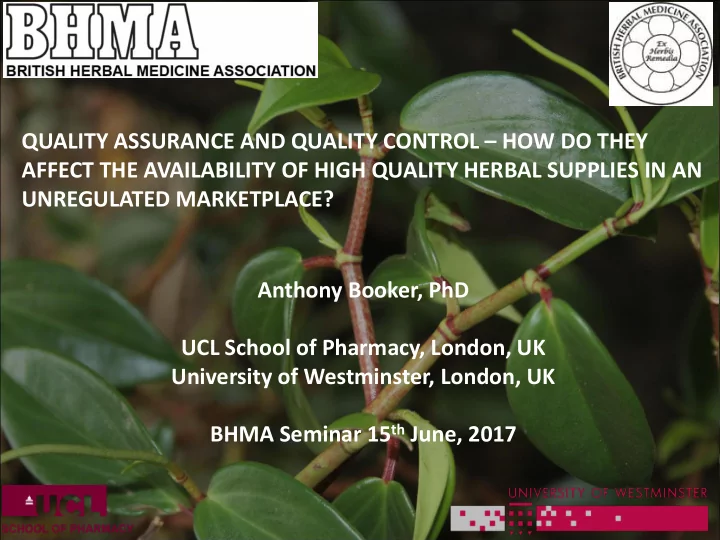

QUALITY ASSURANCE AND QUALITY CONTROL – HOW DO THEY AFFECT THE AVAILABILITY OF HIGH QUALITY HERBAL SUPPLIES IN AN UNREGULATED MARKETPLACE? Anthony Booker, PhD UCL School of Pharmacy, London, UK University of Westminster, London, UK BHMA Seminar 15 th June, 2017
Quality control – a defined protocol that attempts to assess the quality of a substance (either organoleptically or using analytical techniques) using a given sample at a defined point in time. Quality Assurance – good governance of the supply chain from cultivation through to the finished product using recognised procedures and best practices.
Quality Control - Our analysis of turmeric and turmeric products showed that it was possible to separate samples in terms of their species and so detect adulterants. Booker, A., D. Frommenwiler, D. Johnston, Ch. Umealajekwu, E. Reich, M. Heinrich (2014) Journal of Ethnopharmacology 152: 292-301. 10.1016/j.jep.2013.12.042
Quality Control - Our analysis of Rhodiola products showed that a quarter of products were adulterated with the wrong species . BOOKER, A., JALIL, B., FROMMENWILER, D., REICH, E., ZHAI, L., KULIC, Z. & HEINRICH, M. The authenticity and quality of Rhodiola rosea products. Phytomedicine.
Ginkgo biloba Products Quality Control - Out of the 35 samples analysed, 14 were found to contain elevated levels of rutin and/or low ginkgo metabolite content when compared with the reference sample.
Milk Thistle Products Quality Control - 30 % of Milk Thistle products were adulterated or of poor quality
Quality control informs us that there is a quality problem but by itself reveals little regarding the underlying causes. In order to better understand how and why adulteration or poor quality arises , it is ESSENTIAL to investigate the supply chain. The optimum strategy is to visit the site of collection while collection is in progress and follow the product through production. This process will help us to understand how better Quality Assurance can be achieved.
Case history of a a cultivated medicinal plant – Turmeric cultivation and supply
Good agricultural Practice – Quality Assurance – Value addition Testing can show where products have failed but to understand where and why they might fail it is necessary to follow production from the early stages of supply . Die Tests können zeigen, wo Produkte, aber es versäumt haben, zu verstehen, wo und warum sie es scheitern könnte, ist notwendig, die Produktion aus den frühen Phasen der Versorgung zu folgen
Fieldwork in India Primary Processing – Quality Assurance – Value Addition After drying the rhizomes are polished to improve the colour and texture. The polishing process also requires hired machinery. This stage needs to be well controlled as adulterant species or dyes are known to be added at this stage.
Good storage and distribution practices – quality assurance - When the market price is low, many farmers will choose to store the crop until prices rise. It can be stored for up to 5 years (or longer)
Good Agricultural Practice – Quality Assurance - Value Addition
Secondary processing in Bangalore Follows good manufacturing practice guidelines. Centre for Pharmacognosy and Phytotherapy
Good Manufacturing Practice – quality assurance – value addition
A case study investigation of a wild-collected medicinal plant – following the supply chain.
Rhodiola rosea Having a traditional history of medicinal use within Eastern Europe, Scandinavia, Arctic countries, Asia and North America - Rhodiola rosea products have become high value commodities, traded internationally
Rhodiola rosea Questions • How is Rhodiola crenulata sourced? • Can it be confused with R. rosea during collection? • Where is Rhodiola crenulata sold? • Can samples of this species be collected for analysis?
Reported distribution of Chinese Rhodiola species
Getting to the fieldwork site
Rhodiola crenulata is collected by the Yi minority and represents about one third of their income. Are good collection practices being followed?
It is typically dried on the rooftop at 2000 metres altitude Are good collection practices being followed?
And transported to the nearest TCM market – Chengdu Are good distribution practices being followed? At this stage it is simply sold as ‘Hong Jing Tian’ with no differentiation of species.
Conclusions: Analytical methods employed in quality control can be useful tools in order to discover that problems may exist but only through careful control of the supply chain can quality be truly assured.
Thank you for your attention Parts of this research were funded by The Leverhulme Trust and through a charitable donation by Dr. Willmar Schwabe GmbH & Co. KG, Germany. Ginkgo and Milk thistle samples were provided by the BBC, UK. Thanks to Professor P. Dhanabal, Sebastian Pole (Pukka Herbs) and Mr Shastry (Phalada Agro) for providing access to sites in India and Amy Tso (Herbprime) and Dr Wu-Chang Chuang (Sun Ten) for supporting research in Sichuan and Tibet.
Recommend
More recommend